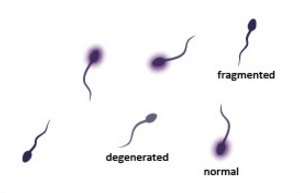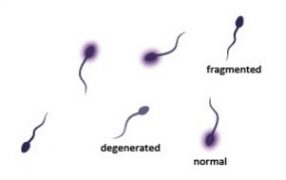検査部のケイトです。
近年、卵子に注目が集まっていましたが、最近、男性の精子に対する医学的研究が増えてきました。

精子のDNAダメージを、精子の形態により評価するのは難しいことですが、精子が50%の役割を担っていることを忘れてはいけません。
Enciso et alにより、数値的な染色体異常のある精子の数(FISH法検査)とDNA断片化レベル(Halosperm法、SDFI)の有意な相関関係が示されたといいます。
45人の内11人は、正常値に比べ、6.46±0.33対3.67±0.17と、精子の異常率が大幅に増加しました。精子の染色体異常率と高度にDNA劣化した精子の数(SDDI)が有意に相関を示しました。
今回の研究は、DNA劣化した精子の異常率の可能性があることが3倍ぐらい増加し、11人中の9人がSDFI値30%以上で過度の異常があるということです。
全ての染色体を評価することは出来ないことがこのトピックの限界ではありますが、これらの精子が異常のある胚を作るリスクは増えるかもしれません。
当院では、受精率の低い患者様の為にHalosperm検査を提供しております。
詳しくはHPをご覧下さい。
Reference:
“Increased numbers of DNA-damaged spermatozoa in samples presenting an elevated rate of numerical chromosome abnormalities”
M.Enciso, S. Afarawati, and D. Wells. Human Repro. 2013.
—
Although the focus for many years has been on the oocytes, recently there has been an increase in scientific research focusing on the male factor, sperm. Due to the characteristics of sperm, it is extremely difficult to evaluate the DNA damage of sperm, however we must remember it is 50% of the whole picture.
Enciso et al found a significant correlation between the proportion of sperm with numerical chromosome abnormality (FISH Test) and the level of DNA fragmentation (using the Halo Sperm Test-SDFI-sperm
DNA Fragmentation Index). 11 out of 45 patients showed significantly increased sperm aneuploidy rates compared to results obtained from fertile controls 6.46+-0.33 versus 3.67+-0.17, respectively.
The sperm chromosome abnormality rate and the number of sperm with highly degraded DNA (SDDI-sperm DNA degradation index) was significantly and positively correlated.
This study found a 3-fold increase in the likelihood of aneuploidy among spermatozoa displaying DNA fragmentation, 9 out of the 11 samples with excessive aneuploidy had high SDFI >30%.
The wider implications of these findings is that this may increase the risk of producing aneuploidy embryos, however the inability to assess the entire chromosome complement is a limitation to all related research regarding this topic. We currently offer this test at our clinic, please ask the staff for details.
Reference:
“Increased numbers of DNA-damaged spermatozoa in samples presenting an elevated rate of numerical chromosome abnormalities”
M.Enciso, S. Afarawati, and D. Wells. Human Repro. 2013.

